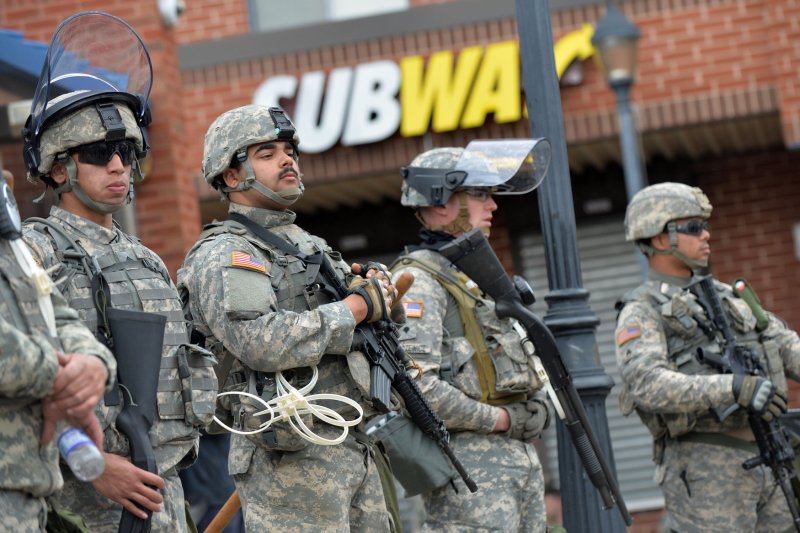Members of the National Guard, who were called in to police Baltimore following the April 19 death of Freddie Gray, started to depart the city on Sunday, May 3, 2015. Maryland Gov. Larry Hogan declared that the "city is safe" and that he anticipates that it will take a little while for the city to return to normal after massive protests and some violence. Photo: Kevin Dietsch/UPI |
License Photo
BALTIMORE, May 3 (UPI) -- Two weeks after the death of Freddie Gray, the city of Baltimore is attempting to return to normal after peaceful demonstrations and violent retaliations resulted in a nightly curfew and the presence of the National Guard.
Sunday morning, Mayor Stephanie Rawlings-Blake lifted the curfew. Sunday afternoon, Maryland Gov. Larry Hogan said Guard troops have started to depart.
"We think it is time to get the community back to normal again," he said. "It has been a very hard week, but we have kept everybody safe. Since Monday night, we haven't had any serious problems."
The governor was referring to rampant rioting and looting that gripped the city following news of Gray's April 12 arrest and death seven days later. Most demonstrations were peaceful, though, officials have said.
While the curfew and National Guard helped keep calm in the city, critics say it wasn't without cost. The economic impact was significant, they say, as all of Baltimore's business was effectively suspended between 10 p.m. and 5 a.m.
Further criticism was leveled at the National Guard's policing, accusing troops of paying substantial attention to the black neighborhoods while leaving white-dominated areas largely undisturbed.
The Maryland chapter of the American Civil Liberties Union blasted the curfew, calling it "an extraordinary measure that has clearly outlived its usefulness, and reminds city residents of their broken relationship with police."
The curfew began April 28 and was scheduled to end May 4, but officials previously said they could lift it sooner.
"My goal has always been to not have the curfew in place a single day longer than was necessary," Rawlings-Blake said Sunday. "I believe we have reached that point today."
While some of the Guard's troops left immediately, Gov. Hogan said it would take about three days for the pullout to be complete. He added that it will likely take even longer for everything in Baltimore to shake off the impact of Gray's death.
"It's going to take a little while for us to get totally back to normal," Hogan said, but noted that "the city is safe."
Gray, 25, was arrested for allegedly attempting to run from officers. A bystander filmed part of the incident as officers were taking Gray into custody and placing him in a police transport. During the trip to a police station, Gray mysteriously sustained a fatal spine injury and a head wound. He was hospitalized and died April 19.
Investigators are now trying to determine how Gray was injured. The police van carrying him made at least four stops en route to the station, authorities have said -- one of which was not previously disclosed nor documented, as is required by the department.
Gray's mysterious death triggered widespread protests in Baltimore and across the United States. Police and security forces from other cities, like New York, even traveled to Baltimore to help maintain law and order.
Six officers have been suspended and charged in the case. Four face felony charges and two face misdemeanors. All six face multiple charges, including second-degree assault, which comes with a possible 10-year sentence.
One officer, Caesar R. Goodson Jr., 45, was charged with second-degree depraved heart murder, a felony with a possible 30-year sentence. The others charged are Officer William G. Porter, 25; Lt. Brian W. Rice, 41; Sgt. Alicia D. White, 30; Officer Edward M. Nero, 29; and Officer Garrett E. Miller, 26.
All six posted bail and were released from jail. They are expected in court on May 27.
Andrew V. Pestano contributed to this report















